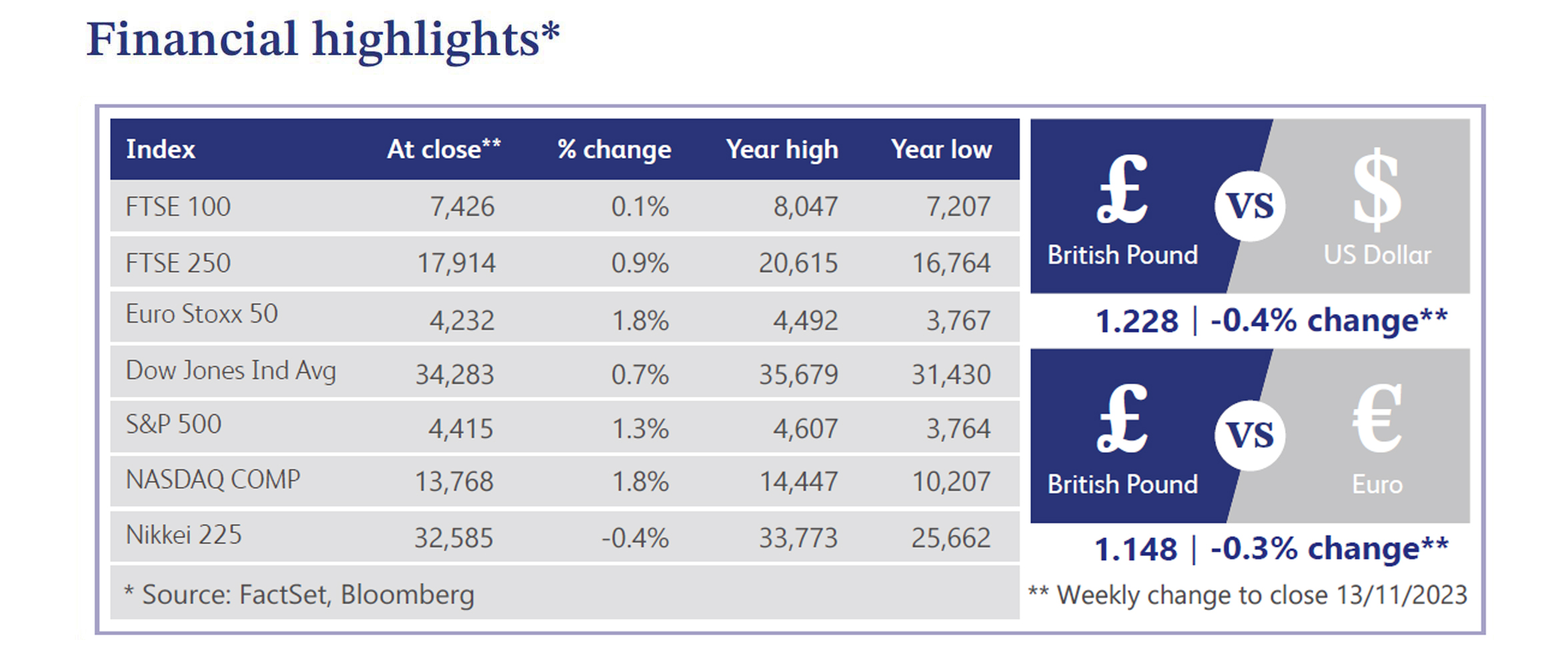
14 November 2023
Market News
Last week, Bloomberg Economics conducted an analysis revealing that the latest forecasts are indicative of turbulent times ahead for the UK economy, with key indicators suggesting that the country may already be in the midst of a recession. After a period of aggressive monetary tightening and rising unemployment, households are becoming more cautious about spending, posing a significant challenge for Prime Minister Rishi Sunak, who faces an upcoming election. The Autumn Budget statement on 22 November is under scrutiny, with scepticism from think tanks about the fiscal headroom for tax cuts. While Bank of England (“BoE”) Governor Andrew Bailey insists it is premature to discuss interest rate cuts, Chief Economist Huw Pill acknowledges investors are not being unreasonable in their prediction for rate cuts next summer. Traders are now anticipating interest rate decreases in the region of 0.75% next year, reflecting a notable shift from just 0.3% last month. The contrasting views within the BoE highlight the complexity of navigating economic uncertainties, especially with the threat of inflation and geopolitical tensions.
The UK economy faced stagnation in the third quarter, with gross domestic product (“GDP”) failing to grow as consumer spending, business investment and government spending all declined. The Financial Times reported that the flat GDP figure poses a challenge for Chancellor Jeremy Hunt as he aims to revive growth in the upcoming Autumn Statement. Furthermore, retail spending growth slowed in October, indicating households are cutting purchases ahead of the festive season. UK grocery inflation dropping below 10% for the first time since July 2022 offers some relief for consumers, but concerns linger as the job market remains sluggish. A survey from KPMG and the Recruitment and Employment Confederation showed a decline in hiring, with rising redundancies leading to an increase in job-seekers. Meanwhile, UK productivity remains a persistent challenge, with total factor productivity only 1.7% higher than the level recorded in the 2008 financial crisis, complicating efforts to boost growth and investment.
The UK housing market presents a mixed picture, with Halifax data revealing the first monthly increase in house prices since March. Cautious sellers holding properties back from the market contributed to this shift. Despite this increase, prices are still down compared to last year. The broader housing market, however, remains resilient, defying predictions of a crash. The standoff between buyers and sellers has limited significant drops in prices, with fewer transactions taking place. London's rental market is showing signs of easing, with a decline in demand and tenants resisting record costs. This regional variation underscores the diverse challenges faced by different sectors within the UK economy, reflecting the ongoing complexities and uncertainties in the market.

Marks & Spencer, the multinational retail company which is focussed on its own label businesses, including food, clothing, homeware and banking services, saw its share price increase by approximately 10.7% last week. The company announced its first half earnings, which showed that adjusted earnings per share were at 12 pence, compared to expectations of 9.8 pence. The company also declared an interim dividend of 1 pence per share, compared to a consensus estimate of 0.9 pence. The results were well received by investors, resulting in the strong share price performance.
Associated British Foods, a UK based diversified food, ingredients and retail company, announced its full year results last week which led to an approximate 9.7% share price increase. The company announced a dividend per share of 60 pence, compared to consensus estimates of 47.7 pence, an approximate 26% increase. Management also announced a new £500 million share buyback programme after it completed its previous programme.
Auto Trader, the digital automotive marketplace, saw its share price increase by approximately 9.1% last week after announcing its first half results. The company reported revenue of approximately £280 million, compared to consensus estimates of £268 million. Auto Trader also announced that the average revenue per retailer grew 12%, largely due to the continued adoption of the company’s additional products and services, alongside a successful pricing and product event in April 2023. The results were generally positive and were welcomed by investors.

Market Commentary prepared by Walker Crips Investment Management Limited.
This publication is intended to be Walker Crips Investment Management’s own commentary on markets. It is not investment research and should not be construed as an offer or solicitation to buy, sell or trade in any of the investments, sectors or asset classes mentioned. The value of any investment and the income arising from it is not guaranteed and can fall as well as rise, so that you may not get back the amount you originally invested. Past performance is not a reliable indicator of future results. Movements in exchange rates can have an adverse effect on the value, price or income of any non-sterling denominated investment. Nothing in this document constitutes advice to undertake a transaction, and if you require professional advice you should contact your financial adviser or your usual contact at Walker Crips. Walker Crips Investment Management Limited is authorised and regulated by the Financial Conduct Authority and is a member of the London Stock Exchange. Registered office: Old Change House, 128 Queen Victoria Street, London, EC4V 4BJ. Registered in England and Wales number 4774117.
Important Note
No news or research content is a recommendation to deal. It is important to remember that the value of investments and the income from them can go down as well as up, so you could get back less than you invest. If you have any doubts about the suitability of any investment for your circumstances, you should contact your financial advisor.